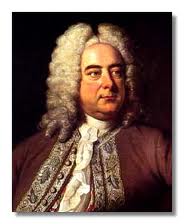February 20, 2017. Handel. George Frideric Handel, one of the greatest composers of the Baroque, was born in Halle on February 23rd of 1685. We’ve written about him many times (here and here, for example), so on this occasion we’ll look into a period of his life following his departure from Italy. Handel lived there for about seven years, from 1703 to 1710. His operas, (especially Agrippina, which was staged during the Carnival in Venice at the end of 1709) and his oratorios and cantatas were so successful that by the end of his stay, while just 25 years old, he was already world famous. Among his admirers were Prince Ernst Georg of Hanover, and the Duke of Manchester, the English ambassador, both of whom invited Handel to their countries. Handel chose Germany and traveled to Hanover, where he was appointed Kapellmeister. We should remind ourselves of an unusual twist in the British royal lineage: by 1710 the Elector of Hanover, Georg Ludwig, was the acknowledged successor to the English throne and, upon Queen Anne’s death would become King George I of England. His son, Prince elector Georg II August, would become King George II. So, Handel was living at the court with intimate ties to Britain. Handel was given a big salary and a special travel allowance, which he used to travel to London in the autumn of 1710. London was always a musical city; one recent development at the time was the popularity of Italian operas, especially when sung by Italian castratos. Giovanni Bononcini was the acknowledged master of opera – that is till Handel’s arrival. As soon as he got to London, Handel set to work on a new opera; to speed up the process he reused some of the material he had written earlier in Italy. The opera was called Rinaldo, and the title role was sung by Nicolo Grimaldo, a castrato known as Nicolini. Nicolini, who became famous for performing major parts in operas by Alessandro Scarlatti, Porpora, Vinci and Bononcini, became one of Handel’s favorite singers. These days the role of Rinaldo is usually sung by mezzo-sopranos or countertenors; Cecilia Bartoli is one of the best interpreters (here she is in the famous aria Lascia ch'io pianga).
and here, for example), so on this occasion we’ll look into a period of his life following his departure from Italy. Handel lived there for about seven years, from 1703 to 1710. His operas, (especially Agrippina, which was staged during the Carnival in Venice at the end of 1709) and his oratorios and cantatas were so successful that by the end of his stay, while just 25 years old, he was already world famous. Among his admirers were Prince Ernst Georg of Hanover, and the Duke of Manchester, the English ambassador, both of whom invited Handel to their countries. Handel chose Germany and traveled to Hanover, where he was appointed Kapellmeister. We should remind ourselves of an unusual twist in the British royal lineage: by 1710 the Elector of Hanover, Georg Ludwig, was the acknowledged successor to the English throne and, upon Queen Anne’s death would become King George I of England. His son, Prince elector Georg II August, would become King George II. So, Handel was living at the court with intimate ties to Britain. Handel was given a big salary and a special travel allowance, which he used to travel to London in the autumn of 1710. London was always a musical city; one recent development at the time was the popularity of Italian operas, especially when sung by Italian castratos. Giovanni Bononcini was the acknowledged master of opera – that is till Handel’s arrival. As soon as he got to London, Handel set to work on a new opera; to speed up the process he reused some of the material he had written earlier in Italy. The opera was called Rinaldo, and the title role was sung by Nicolo Grimaldo, a castrato known as Nicolini. Nicolini, who became famous for performing major parts in operas by Alessandro Scarlatti, Porpora, Vinci and Bononcini, became one of Handel’s favorite singers. These days the role of Rinaldo is usually sung by mezzo-sopranos or countertenors; Cecilia Bartoli is one of the best interpreters (here she is in the famous aria Lascia ch'io pianga).
Rinaldo was a tremendous success but Handle had to return to Hanover, where he stayed for another year and a half. He obtained a leave from the court and moved to London by the end of 1712. There, he wrote two more operas, and even though they were not as successful as Rinaldo, which had continued to be staged practically every season; his popularity didn’t suffer. In the summer of 1714 the Elector of Hanover moved to London; on August 1st Queen Anne suffered a stroke and died, and George was proclaimed the King. Even though his relationship with Handel during the previous two years had gotten frostier (George resented that Handel preferred London to his court in Hanover) it became more cordial after the coronation. Te Deum and Jubilate, which Handel composed in 1714, were performed for the King, after which George doubled Handel’s salary. During the next five years, Handel didn’t write a single opera, concentrating instead on orchestral compositions and chamber pieces. His most successful composition of the period was Water Music, an orchestral suite written for George I to accompany him on his boat trip up the Thames. Water Music consists of three separate suites; here’s the first one, performed by the Academy Of St. Martin in the Fields under the direction of the late Neville Marriner.
| Source: | https://www.classicalconnect.com/node/12026 |
| Website: | Classical Connect |